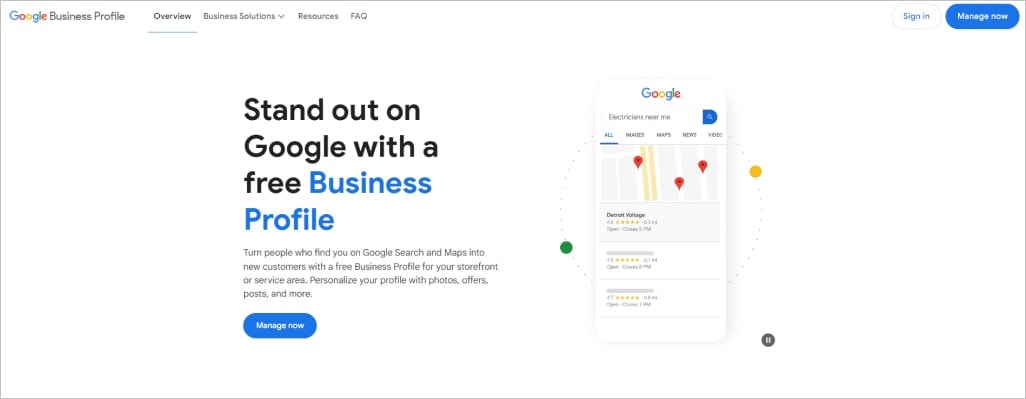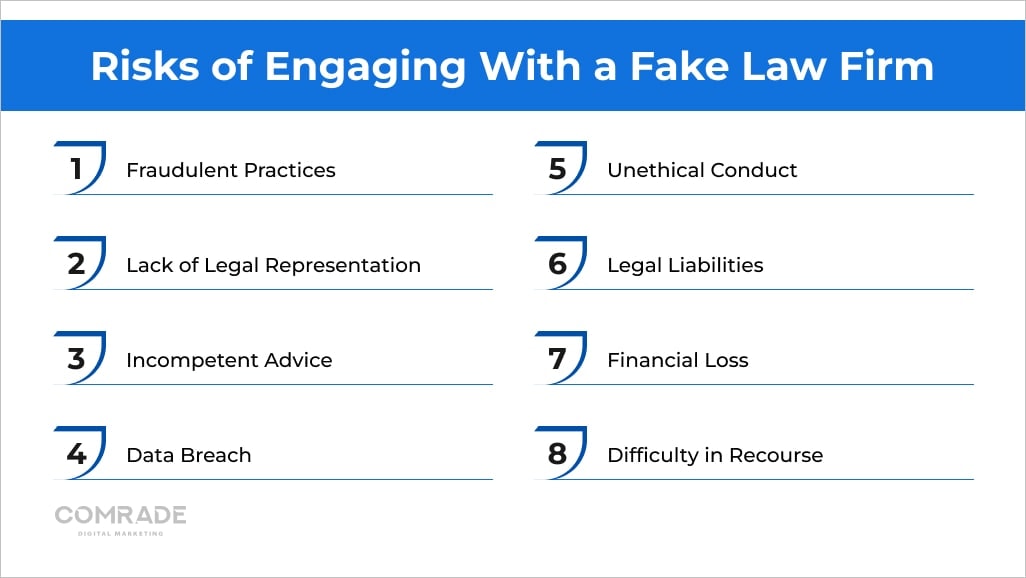Finding legitimate legal representation often starts with a quick Google search, but spotting fake law firms and scam lawyers has become increasingly challenging. With sophisticated fraudulent law firms creating convincing online profiles, these quick searches don’t always lead to trustworthy legal services. Fake law firms have become increasingly sophisticated at creating convincing online profiles that can easily fool unsuspecting clients. With polished websites, glossy photos, and seemingly stellar reviews, these fraudulent entities are designed to mislead and exploit.
So, how can you ensure that the firm you’re considering is legitimate and trustworthy? Our experts at Comrade Digital Marketing will guide you through the crucial steps to differentiate between genuine legal experts and their deceptive counterparts. From scrutinizing their Google Business Profile for red flags to understanding the common tactics used by scammers, we’ll arm you with the knowledge needed to make informed decisions and avoid falling victim to legal fraud.
Ready to 3x Your Law Firm's ROI?
Join 300+ law firms who've increased their caseload with our proven legal marketing strategies
What is a Google Business Profile

A Google Business Profile is a free tool provided by Google that allows businesses to manage their online presence across Google’s platforms, including Search and Maps.
By creating and optimizing a Business Profile, companies can control how they appear in local search results, including essential information such as their address, phone number, website, business hours, and customer reviews.
This profile is crucial for improving visibility and engaging with potential clients, providing a snapshot of the business that can help attract and inform users searching for relevant services.
Comrade Digital Marketing Agency can help you with the above if you’re unsure how to go about it. Schedule a free consultation.
8 Red Flags for Identifying Fake Law Firms on Google Business Profile
When searching for legal assistance, finding a trustworthy law firm is crucial. Unfortunately, fake law firms can sometimes slip through the cracks on Google Business Profiles. To protect yourself from scams, it’s essential to know what to look for. In this guide, we’ll uncover 8 red flags that can help you identify fake law firms. By staying informed, you can better ensure you’re engaging with legitimate professionals. Read on to safeguard your search for the right legal representation!
1. Inconsistent Contact Information
When assessing the legitimacy of a local law firm on Google Business Profile, inconsistent contact information is a significant red flag. Reliable law firms usually maintain consistent and accurate contact details across all online platforms. If you notice discrepancies in phone numbers, email addresses, or office addresses, this could be a sign of a fake or fraudulent entity.
To evaluate this red flag, follow these steps:
Cross-check Contact Information: Compare the contact details listed on Google Business Profile with those on the firm’s official website and other legal directories.
Verify Through Multiple Sources: Call the listed phone numbers to check if the calls are answered professionally, and send emails to confirm the responsiveness and accuracy of the email addresses provided.
Inconsistent contact information can undermine trust and suggest a lack of professionalism. Always verify these details through multiple sources to ensure you’re dealing with a credible law firm.
More visibility means more clients! See how law firm SEO can grow your practice—read the article today!
2. Unverified Reviews and Ratings
Fake reviews and ratings can be a significant warning sign when evaluating a law firm on Google Business Profile. Genuine reviews often come from actual clients who have had direct interactions with the firm. Fake law firms may manipulate their online reputation by posting fabricated reviews or generating misleading ratings.
To assess this issue, consider the following steps:
Scrutinize Review Authenticity: Look for reviews that seem generic or overly positive without specific details about the service. Genuine reviews usually include detailed experiences or case outcomes.
Check for Verified Reviewer Profiles: Review profiles with no personal information, and look for reviews that seem to be from newly created accounts, which should raise suspicion.
Suspicious and fake Google reviews can distort the true reputation of a law firm. It’s important to critically evaluate reviews and ratings, focusing on authenticity and relevance, to protect yourself from potential fraud.
Don’t waste money on ineffective marketing! Optimize your digital marketing for law firms with our expert guide.
3. Suspiciously High or Low Number of Reviews
A law firm with either an unusually high or low number of reviews can be a cause for concern when assessing its credibility on Google Business Profile. Authentic law firms typically have a steady flow of reviews that reflect their ongoing client interactions. An abnormally high number of reviews within a short period may indicate that reviews are being manipulated or fabricated. Conversely, a very low number of reviews could suggest that the firm is either newly established or not as reputable as claimed.
To investigate this red flag, follow these steps:
Compare Review Volume with Industry Standards: Compare the number of reviews to other law firms in the same geographic area and practice area to gauge if the volume is realistic.
Look for Review Patterns: Analyze the timing and frequency of reviews. A surge of reviews in a short period or a lack of recent reviews could indicate artificial activity.
Anomalies in review numbers can signal potential deception or inexperience. A consistent review history that aligns with industry standards usually indicates a more reliable law firm.
Need more visibility for your legal practice? See how content marketing for lawyers can help!
4. Lack of Professional Website Link
A legitimate law firm typically maintains a professional and functional website, providing detailed information about their services, team, and contact details. If a law firm’s Google Business Profile lacks a link to a professional website, it could be a warning sign of a fake or fraudulent entity. A well-designed website is a key indicator of a law firm’s legitimacy and commitment to its practice.
To address this issue, take these steps:
Check for a Website Link: Look for a link to the firm’s official website on their Google Business Profile. If there is no website or if the link directs to a generic or unrelated page, this could be suspicious.
Evaluate the Website’s Quality: If a website link is provided, assess its professionalism, functionality, and relevance. A credible law firm should have a well-maintained site that reflects their practice’s seriousness.
The absence of a professional website can suggest a lack of credibility or an attempt to avoid scrutiny. By verifying the presence and quality of a firm’s website, you can better ensure that you are dealing with a legitimate law firm.
Get more cases with highly targeted ads! Our PPC marketing for lawyers guide shows you how—start optimizing now.
5. Absence of Realistic Client Photos
The presence of authentic client photos on a law firm’s Google Business Profile can provide valuable insight into the firm’s real-world operations and client interactions. Fake or unestablished law firms often lack genuine client photos, opting instead for stock images or unrelated visuals. Realistic client photos, such as those of the firm’s office environment or team members, help establish credibility and provide a transparent view of the firm’s actual operations.
To evaluate this red flag, consider the following steps:
Look for Authentic Visual Content: Check if the images on the profile feature the firm’s actual office, staff, or events. Genuine photos usually depict real scenarios rather than generic stock images.
Cross-Reference with Other Sources: Compare the visual content on Google Business Profile with the firm’s website or social media profiles to ensure consistency and authenticity.
An absence of realistic client photos can be a sign of a fraudulent firm trying to hide its true nature. Verifying the authenticity of visual content helps to assess the firm’s legitimacy and transparency.
6. Generic or Unprofessional Business Descriptions
A law firm’s business description on Google Business Profile should be detailed, professional, and tailored to its specific practice areas and expertise. Generic or unprofessional descriptions may indicate that the profile is managed by a fraudulent entity or someone with little understanding of the legal industry. Authentic law firms usually provide clear, detailed descriptions that reflect their services, qualifications, and unique value propositions.
To identify this red flag, follow these steps:
Analyze the Description’s Specificity: Look for detailed descriptions that include specific practice areas, client benefits, and firm qualifications. Generic terms or vague language can be a red flag.
Assess Professional Tone and Accuracy: Evaluate whether the description maintains a professional tone and is free from spelling or grammatical errors. Unprofessional language or errors can indicate a lack of genuine expertise.
Generic or unprofessional descriptions can undermine a law firm’s credibility and suggest that the firm may not be as established or reliable as it claims. However, a detailed and polished description is a key indicator of a legitimate law firm.
Struggling to grow your law firm’s presence online? Discover powerful social media strategies for lawyers today!
7. Unusual Business Hours or Location Data
Unusual business hours or location data on a law firm’s Google Business Profile can be indicative of potential issues with the firm’s legitimacy. Many law firms typically operate within standard business hours, and their locations are usually situated in established commercial or legal districts. If the business hours are irregular or the location appears suspicious—such as a residential address or a virtual office—it could suggest that the firm is not operating legitimately.
To assess this red flag, take these steps:
Verify Business Hours: Check if the hours listed align with standard office hours for law firms and if they match the firm’s website or other legal directories.
Examine Location Data: Look for the firm’s physical address and verify it using mapping services. A legitimate law firm should be located in a professional setting rather than a residential area or an obscure location.
Irregular business hours or questionable location data can raise concerns about the firm’s authenticity. Ensuring that business hours and locations are consistent with industry norms and standards will help you verify the legitimacy of the law firm you’re considering.

8. No Verified Google Business Badge
A verified Google Business Badge indicates that Google has validated the business’s legitimacy and authenticity. If a law firm’s Google Business Profile lacks this badge, it could suggest that the profile has not undergone Google’s verification process or that the business might be fraudulent. The badge serves as a trust signal, showing that the business has provided accurate information and undergone a verification process.
To investigate this red flag, follow these steps:
Look for the Verified Badge: Check the profile for a “Verified” badge, which typically appears next to the business name or in the profile details.
Verify Through Google’s Business Listings: Search for the law firm’s profile on Google Business and see if there is any mention of verification status or if it directs you to a non-verified profile.
The absence of a verified Google Business Badge can indicate potential issues with the firm’s credibility. Verification helps ensure that the information provided is accurate and trustworthy, making it an important factor in confirming a law firm’s legitimacy.
Dangers of Engaging with Fake Law Firms and Legal Scams
Spotting fake law firms on Google Business Profile is crucial to finding the best representation for your needs. These fraudulent entities can not only jeopardize your legal matters but also put your personal information at risk. Understanding the potential dangers of engaging with such deceitful operations can help you make informed decisions and protect yourself from costly and damaging consequences:

Attorney Fraud: Scam lawyers and fraudulent law firms commonly engage in deceptive practices of their money or sensitive information.
Lack of Legal Representation: Clients may receive no actual legal services or representation, leaving their legal issues unresolved.
Incompetent Advice: Misinformation or inadequate legal advice can lead to poor decision-making and negative outcomes in legal matters.
Data Breach: Fake firms might collect personal and financial information for malicious purposes, risking identity theft or financial loss.
Unethical Conduct: Fake law firms may operate with unethical practices, potentially causing harm or legal trouble for clients.
Legal Liabilities: Engaging with a fake firm can result in complications if legal documents or agreements are improperly handled or invalid.
Financial Loss: Clients may face significant financial loss from paying for services that are never rendered or through fraudulent schemes.
Difficulty in Recourse: Seeking legal recourse or refunds can be challenging when dealing with a non-existent or fraudulent entity.
Avoiding fake law firms is essential to safeguard your legal rights and financial well-being. By being vigilant and aware of the risks, you can ensure that you’re working with legitimate professionals who provide genuine services. Don’t let deception undermine your legal needs—stay informed and protect yourself from the dangers of fake legal practices.
Conclusion
When seeking legitimate law firms and avoiding legal scams, it’s crucial to verify professional credentials before engaging with any legal services provider, you want to partner with the best of the best, but along the way, you may encounter fraudulent firms. While navigating the online landscape to identify fake law firms on Google Business Profile can be challenging, with the right tools and knowledge, you can safeguard yourself from deceit. Look out for signs like unverified credentials, inconsistent contact details, and questionable client feedback. Authentic law firms will present a polished, transparent online image and provide clear, trustworthy information to potential clients.
If you’re ever in doubt, consider consulting with experts to ensure your search leads to genuine and reliable legal assistance. At Comrade Digital Marketing, we’re here to help law firms establish and maintain a credible online presence. Contact us now to find out how our expertise can elevate your digital profile and protect your reputation from fraudsters. Let’s work together to keep your firm’s online identity solid and trustworthy!
Frequently Asked Questions
-
Is it safe to rely on Google’s verification checkmark?
While Google’s verification checkmark suggests that a business has been verified by Google, it’s not a guarantee of authenticity. This applies to various sectors, including personal injury lawyers. Some fake law firms might still obtain this checkmark. To ensure you are dealing with a legitimate business, it’s important to corroborate their credibility through additional methods. For instance, check their credentials with local or state bar associations, review their business listing on Google Maps, and read independent reviews on multiple platforms.
-
What should I do if a law firm’s Google Business Profile has no reviews?
If a law firm’s Google Business Profile has no reviews, it might be a red flag, possibly indicating a fake listing. In such cases, it’s crucial to be cautious and conduct further research. Ensure the firm adheres to business guidelines by checking for a professional website, active social media profiles, and mentions in news articles or legal directories. Contacting the firm directly to request references can also be helpful. If you have concerns, reaching out to Google support for clarification on the legitimacy of the listing could also be a prudent step.
-
How can I find additional information about a law firm beyond Google Business Profile?
To verify a law firm’s legitimacy and avoid fake listings, check their credentials with local or state bar associations, which provide details about their licensing and any disciplinary actions. Look for information on their website to ensure professionalism and accurate contact details, and search for client testimonials on independent review sites to find negative reviews. Also, consider checking legal directories and consulting local legal communities for further insights.

